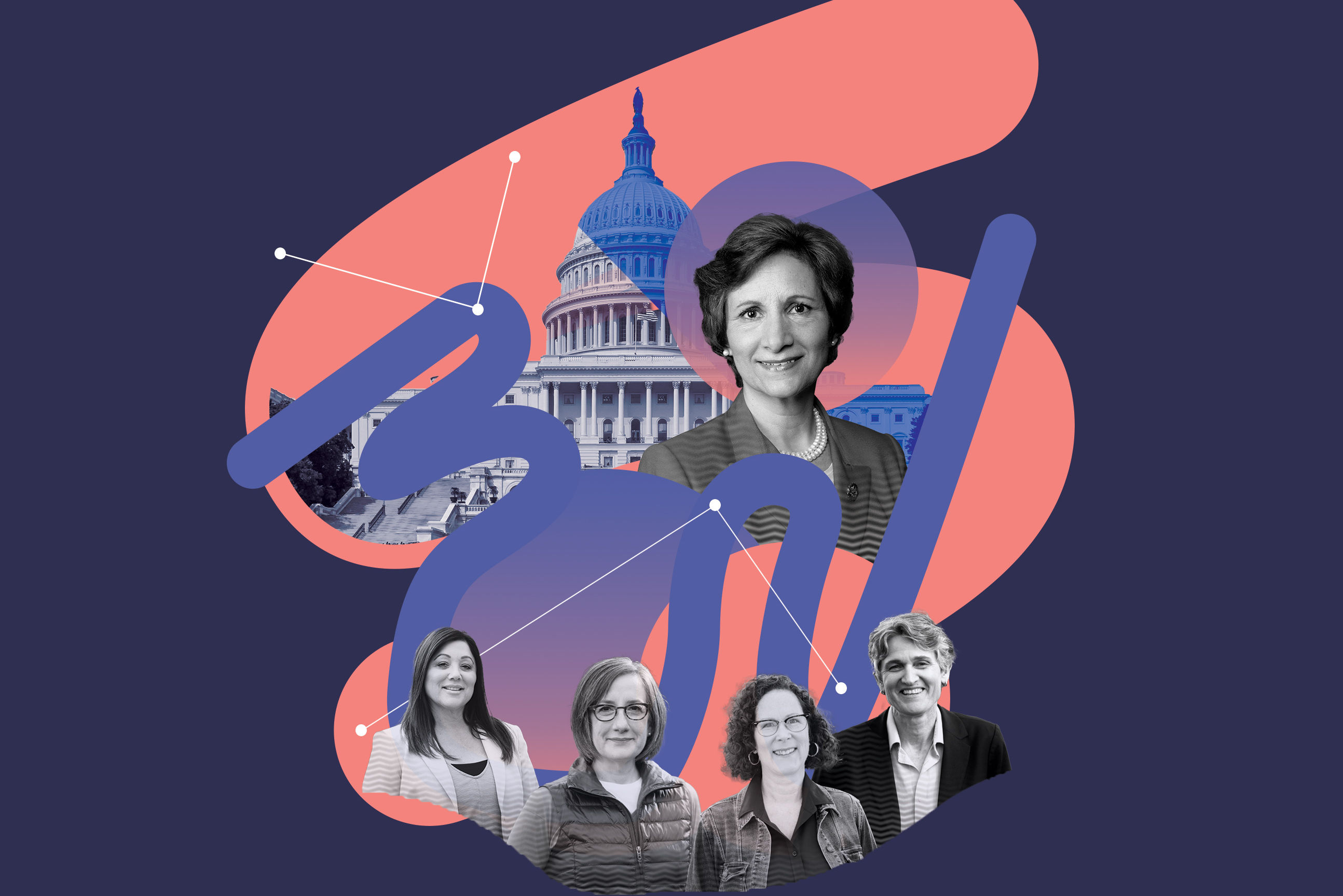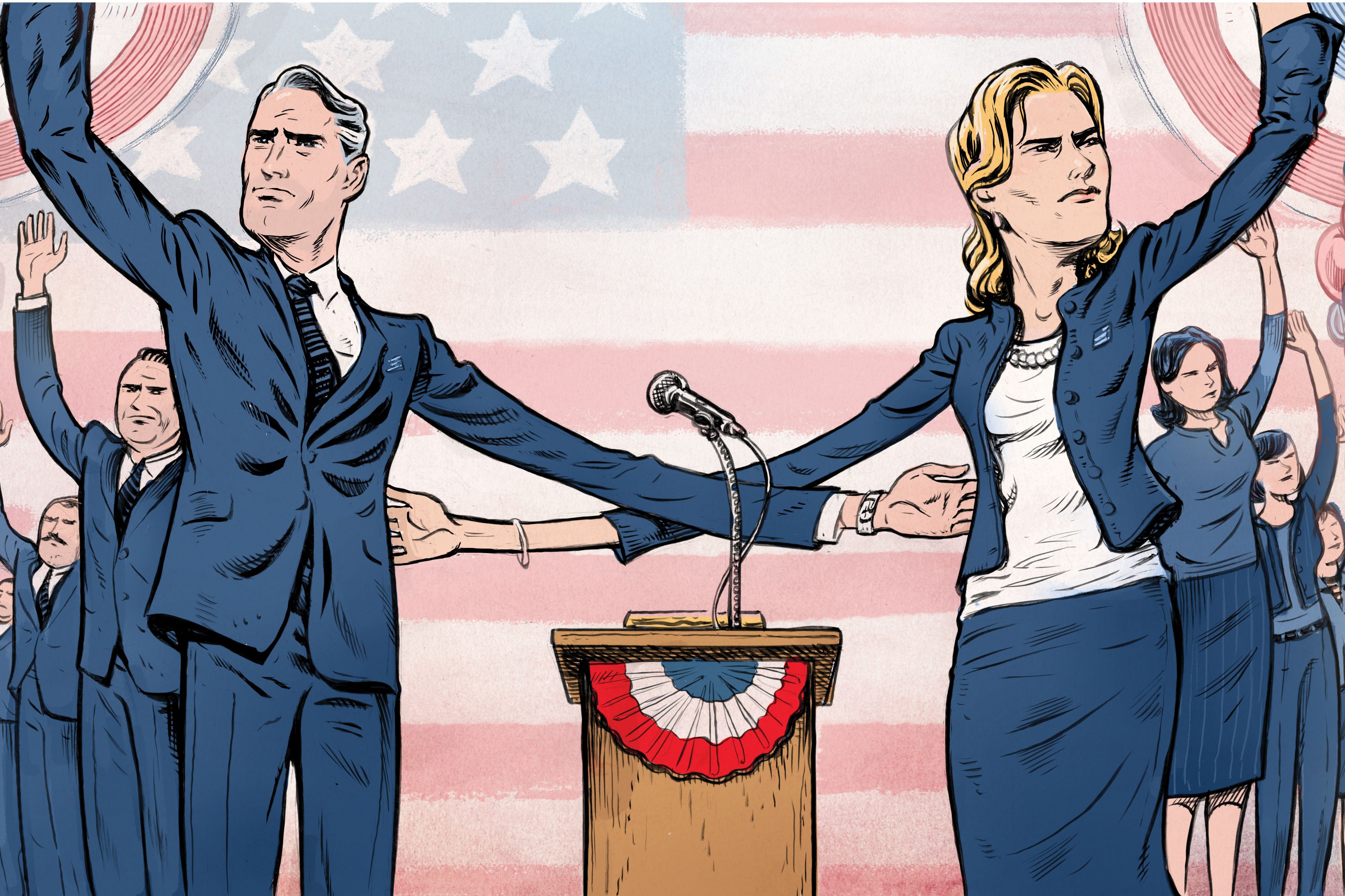
Suzanne Bonamici Is Ready for Some Company

Suzanne Bonamici (top) could soon be joined in Congress by Lori Chavez-DeRemer (from left), Andrea Salinas, Val Hoyle, and/or Jamie McLeod-Skinner.
When Suzanne Bonamici was elected to represent Oregon’s First Congressional District in 2012, she was the only woman in the state’s delegation, DC bound with six male colleagues. And so it remained for 10 years. But finally, the future is female—or female-er, at least. This year, with her own reelection pretty well a foregone conclusion, Bonamici will be joined by at least one more woman—Lori Chavez-DeRemer and Jamie McLeod-Skinner (at left and right, above) are the two in contention for the Fifth District seat. And if the new Sixth District’s Andrea Salinas and Fourth District’s Val Hoyle (second and third from left) prevail as well, the balance would flip to half female.
That’s a big change for Oregon and a big change for Bonamici, who is all too aware of the barriers for women in politics. She says she herself hesitated to run for office before her first bid for a seat at the Oregon House in 2006: “I’d worked as a legislative assistant. I have a law degree. I had worked in DC at the Federal Trade Commission, but I still questioned whether I was qualified to run for the state legislature.”
But run she did, and followed that up with a win for a State Senate seat, serving one term there before getting elected to Congress with 54 percent of the vote.
When it comes to her male colleagues, she says, she has found things in common with each of them. “I never really felt like they didn’t listen to me or consider me a colleague because I’m a woman,” she says. “That being said, I’m really looking forward to not being the only woman.”
Portland Monthly: Does it make a difference to elect women in terms of priorities?
Suzanne Bonamici: Yeah, I have noticed that it does make a difference because women tend to focus on things that they personally experience, like the Pregnant Workers Fairness Act, for example. Men might support that, but it’s not going to be at the top of their agenda necessarily. Of course, there’s always exceptions to some of these things. Like paid family leave: there are a lot of men who support those policies. But I can remember trying to negotiate leave when I had my children and how challenging it was, and it tends to be an issue that affects more women, and women will tend to put that at the top.
Do you think women in general have a different approach to the job? With exceptions, women tend to have a more collaborative approach. One of the government shutdowns that I’ve been through, it was women and having conversations about “Let’s figure out how we can solve this” [that moved the dial]. And I found that just in terms of overall politics, women more than men tend to run for a particular reason, to fix things, to improve public education, to address the climate crisis. Oftentimes men run because they want to be in Congress. Again, there are exceptions, and I can point to many. But in general, I think women tend to have this “I’m going to fix things” approach to policymaking.
How does that collaboration play out? Several years ago, a Republican woman who’s no longer in Congress from Indiana, Susan Brooks—it was during one of the shutdowns, and we were talking and she said, “Gosh, I ran for Congress to solve problems, and now the government’s shut down.” And I said, “Yeah, it’s really frustrating. Let’s have lunch.” So we built a friendship, and then we found out that she had been a US Attorney and also defended cases at the federal level. And so when it was time to fund the Federal Defender Service, I went to her and she became co-leader in that effort. So you build those relationships, and you do that by having these conversations. One conversation happened to start in the women’s restroom—not that that’s the recommended place to have policy conversations—but you take advantage of it when you can. I think that finding common ground and collaborating and solving a problem—I look forward to seeing more of that.
Every year there are a couple of charity events in DC in Congress. The men have a baseball game and they play at the National Stadium. It’s a big deal. And in the men’s baseball game, the Democrats play the Republicans, and the Democrats show up and sit in the Democratic section and wear blue shirts and wave donkey flags, and the Republicans wear red shirts, and they show up and sit in their Republican section and they wave elephant flags, and it’s all great fun and they raise money for charity.
But then when the women play their women’s softball game, instead of playing each other, the women, the Democrats and Republicans in the House and the Senate, all form one team and play the press. And to me, it just sort of exemplifies: “OK, we’re gonna raise money for charity. We’re going to do it by forming one team, Democrats, Republicans, House, and Senate, instead of fighting each other.” It just exemplifies the different approach by women.
How important are relationships with other women in government? A lot of my close friends are women. I have this text group—I have a couple of them, in fact, of mostly women. And that gets me through, especially on days like January 6, [when] we’re trying to figure out what’s going on.
Can you tell me what happened? Well, I was in my office because of COVID—there was a schedule for when we could go sit on the floor so that everybody wasn’t there at the same time. It wasn’t my turn, so I was in my office, and first because of that bomb threat one of the office buildings was evacuated. So the text chain started: a lot of my women friends were on the floor or in the gallery. We were checking on people, you know, “What’s going on? Some shots have been fired.” I mean, we just use it to support each other. And we check on each other when we’re in our home districts, when people have been through grief or loss—it’s just been a great group to be a part of and it really has helped me get through those particularly hard times.
To bring it back, it’s a big moment for Oregon to have more women representing a state that has already broken ground in terms of leadership roles within the state.
I do want to point out to that history is going to be made on the other side of the country. After the November election, there will no longer be any state in the country that has not sent a woman to Congress. There is one* right now. It has never sent a woman to Congress, but that’s going to change in November. Want to guess where?
(*It's Vermont.)




